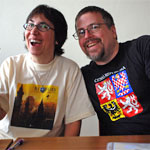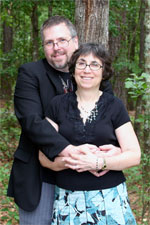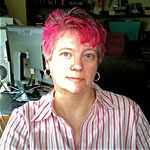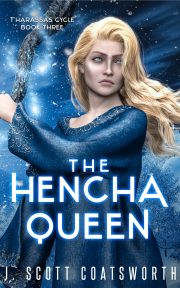The Weird World of the VanderMeers, Part III
by Cat Rambo
 This is the conclusion to a three-part interview with Ann VanderMeer and Jeff VanderMeer. Don’t miss Part I and Part II.
This is the conclusion to a three-part interview with Ann VanderMeer and Jeff VanderMeer. Don’t miss Part I and Part II.
Gender/race balance in ToCs is often a contentious discussion in speculative fiction. How do you work to address it in your works? Are there other balances you think it’s important to maintain/address?
ANN: I honestly don’t care about race or gender or sexual orientation or age or nationality or fame (or infamy for that matter). I only care about a great story, but I don’t like the same type of great story over and over again, and that’s where diversity comes in. You have to have diversity in every project, even ones with a narrow scope, otherwise it just becomes the boring same old same old. By diversity, I am not just talking about the writer, but the story itself–the type of story and how each writer approaches their fiction. The key to balance in anthologies is being widely read and also knowing as many writers as possible so when making solicitations you don’t just go to the same old names. Otherwise you can easily end up with pale, male, and stale (I can’t remember where I heard that but it cracked me up and is so true). Because I love to read all different kinds of books, I am introduced to so many great writers. That’s the key–step out of your own familiar area and read something different.
JEFF: There are at least two issues here: fair access to the marketplace and celebrating as many unique voices as possible, both of which are desirable for the health of any group, including fantasy, SF, and horror, and the subsidiary communities that support them. Recently, posts by Tricia Sullivan and Cheryl Morgan have begun to tackle the subject of women in the field in what I feel is the most productive way. Basically saying “Yes, there is a gender bias problem, but the causes of it are very complex and pillorying individual editors doesn’t move us forward,” especially in cases where a body of work suggests more balance than an individual anthology. More facts, less ideological posturing, and I must respectfully disagree with anyone on the right or the left who says there is only one way to talk about these issues.
I’d add that, for our purposes, a little less foregrounding of ideas like subconscious bias would be good, since in an odd way that seems to let editors off the hook for sloppy conceptualization and sloppy execution. You can be damned sure we know our own tastes inside and out, and that we have plenty of conversations about why we’re responding or not responding to something in a story that doesn’t come in technically deficient–testing our assumptions about the stories, etc. Also, editors are successful because they have a particular viewpoint or stance, because of their preferences. I don’t like vampire stories and Ann’s rarely fond of them. You won’t find many vampire stories in our anthologies. But guess what–there are metric tons of vampire anthologies out there, so no one’s suffering because of our blind spot. If we’re going to have a bias, it’s going to be in favor of material that isn’t getting enough attention because what’s the point of just adding your voice to a chorus? How is that providing anything unique?
There are several approaches to anthos that affect balance: open reading periods, solicitation only, a mix, and that’s in the context of anthos of reprints or originals, general themes or more specific ones. If we’re doing an original anthology with an open reading period, ninety percent of what comes in is going to be bad at the objective level of craft. Of the remaining ten percent, which may include some material that’s not technically great but contains great imagination, three percent will be outside of the scope of our anthology guidelines. Another three percent hits blind spots for both of us that are part of our editorial identity and part of the reason readers pick up our anthologies. So we’ll be picking our finals out of a very small sample, and hopefully that sample has some balance to it.
Our current modus operandi when soliciting stories for fiction anthologies is to most definitely think about balance–and we also try to have open reading periods whenever possible, and bolster them with solicitation as necessary. I don’t know how striving for balance can be at all controversial–there is such a wealth of fantastical writers here and abroad that we can come up with lists for solicitation that are balanced in a lot of different ways. The fact is, there are probably 200 to 300 writers around the world we’d like to work with, maybe more, so seeking balance whenever possible just reflects that. (Like Ann said earlier, we want different kinds of approaches to stories, too.) An editor who can’t usually doesn’t know enough writers or isn’t widely enough read or has chosen to do a historical anthology during a period or within a subgenre that doesn’t have much diversity to it. But it is easier and easier to solicit from a wealth of diverse voices and this makes me very, very happy. Nothing is more invigorating to us than finding new, strong, interesting voices in fiction. And although we have had times when it has been hard to get fiction from women, we’ve found it’s become easier and easier. We don’t know if this is a matter of having built trust or having perfected solicitation methods.
Other balances include mainstream/genre, commercial/literary, traditional/experimental, to use crude divisions. Unfortunately, even after twenty-five years in the field, we are still fighting the same stupid mainstream-genre battles and the same traditional-experimental battles. It’s tiresome since it actually impacts the diversity issue when genre readers or gatekeepers render invisible contributions to the fantastic from the mainstream, and vice versa. It also impacts the bottom line in terms of the kinds of projects and approaches that get green-lit.
ANN: On the reader side, the advocacy needed that’s most important is buying the anthologies that you feel do a good job. Nothing gives an anthologist more leverage to continue providing different types of stories than affirmation through sales.
How many books and stories do you think you read per week? What do you read for pleasure? Are there any genres that are anathema to you?
ANN: I am currently looked at over 1500 stories in my slush pile right now–oy vey! As for pleasure reading, I love reading crime/detective/mystery fiction. Some of my favorite for pleasure writers are Meg Gardiner, Laura Lippman, Faye Kellerman, Michael Connolly, Stuart Kaminsky and Ayelet Waldman. I like to read non-fiction, to take me completely out of my daily work. (And I enjoyed the Stieg Larsson books as well, another guilty pleasure? Perhaps.) Kevin Brockmeier is one of my favorite writers, so is Nicole Krauss. I like to read biographies–currently reading Stacy Schiff’s Cleopatra. I am also a long-time subscriber to VOGUE Magazine. I know, hard to believe when you look at me, right? But in all seriousness, the articles are thought provoking and the layout, design and photographs are spectacular.
JEFF: Not really sure what it averages out to, but I read something every day. For pleasure, I read noir fiction, histories, and mainstream fiction. I tend to dislike most westerns, paranormal romance, anything with standard tropes like zombies in it, child or teenage protagonists, and anything falsely cheery, although I love humorous novels with weight.
What publishing houses are doing cool stuff right now? What would you like to see more of?
JEFF: The energy for my money is all with publishers like Small Beer, Dalkey Archive Press, Aqueduct Press, Coffeehouse Press, and places like that. Strong, committed independents willing to take a chance on great, hard-to-classify material. I mention those presses because they don’t get enough attention sometimes, but at the same time some of our most eccentric and hard-to-classify projects have come out from places like Bantam and HarperCollins. We need to recognize that we have strong and imaginative editors in a lot of different places and we need to support them for taking chances.
Jeff, you recently said on Facebook “84 personalized e-mails to Lambshead Cabinet antho contributors done. Remind me again why we do these mega-anthos?!?!?!?! Oh, that’s right. Because no one else does.” Why do you think you’re the only ones doing mega-anthos?
JEFF: No one should be held to an off-the-cuff remark on Facebook, but I’ll take a stab at it. There’s an advantage for us in working as a team in terms of workload, and an advantage in me also being a fiction writer, because it is easier to do large-scale projects with lots of moving parts, and easier to do projects like The Thackery T. Lambshead Cabinet of Curiosities because they require framing narratives, and I can provide that myself. I think that some of our projects are mega because of scope, and some are mega because of the heavy use of graphical elements, and some because of both elements combined with our ability to find interesting structures within the anthologies. … Basically, we get bored easily and we’re always looking to push ourselves, and we’ve become used to working with dozens of artists and writers at one time.
ANN: I love a challenge.
What editors of the past shape your philosophy of editing? What, in a nutshell, -is- your philosophy of editing?
JEFF: The horror anthologies edited by David Hartwell and Kathryn Cramer are remarkable accomplishments and were touchstones while editing The Weird. Marvin Kaye’s various horror and weird anthologies are treasure-troves of great and eccentric choices, and often include translations and sometimes writers from the mainstream. The Black Water anthologies by Eduardo Galeano are hit-or-miss, in part due to his tendency to excerpt, but still energizing. Another touchstone for me is just New Worlds magazine and Michael Moorcock’s efforts there. As for a philosophy of editing, I’m not sure we have one, except to never let fear of failure stop us from embarking on a new project–indeed, jump in with both feet. But in thinking about the question I wrote down a few words that speak to me personally re this question: Trust, Responsibility, Love, Humor, and Passion. Books matter. Books create a covenant with the reader. You must love what you’re doing. You must bring a sense of humor and you must have passion for the work.
ANN: Along with the ones that Jeff named, I have to mention Judith Merril. As we started working on more projects, we came across a lot of anthologies from the 1950s-1970s. I also have to mention Dorothy McIlwraith, the first female editor of Weird Tales (I am only the second). Knowing how much work goes into these projects gave me a great appreciation for what they accomplished, especially considering the field for women at the time. And I think of them sometimes when I am faced with a difficult situation. My philosophy? I think I touched on that in the first question–I see myself as a cheerleader of sorts for these stories and these writers. But I also give a lot of credit to my reading audience. They inspire me to work more diligently to provide them with something even more fantastic than the last time.
•••
 Hugo Award winner Ann VanderMeer and World Fantasy Award winner Jeff VanderMeer have recently co-edited such anthologies as Best American Fantasy #1 & 2, Steampunk, Steampunk Reloaded, The New Weird, Last Drink Bird Head, Fast Ships, Black Sails, and The Thackery T. Lambshead Cabinet of Curiosities. They are the co-authors of The Kosher Guide to Imaginary Animals. Future projects include The Weird: A Compendium of Strange and Dark Fictions for Atlantic and two indie anthologies ODD? (Is it Odd Or Are You Too Normal?) and BESTIARY. Jeff’s latest books are the novel Finch, the story collection The Third Bear, and the coffee table book The Steampunk Bible (with S.J. Chambers. Ann is the editor-in-chief of Weird Tales magazine and has a regular art column on the popular SF/fantasy website io9. Together, they have been profiled by National Public Radio and the NewYork Times’ Papercuts blog. They are active teachers, and have taught at Clarion San Diego, Odyssey, and the teen writing camp Shared Worlds, for which Jeff serves as the assistant director. Speaking engagements have included MIT, the Library of Congress, and World of Warcraft. They live in Tallahassee, Florida, with too many books. For more information, visit www.jeffvandermeer.com.
Hugo Award winner Ann VanderMeer and World Fantasy Award winner Jeff VanderMeer have recently co-edited such anthologies as Best American Fantasy #1 & 2, Steampunk, Steampunk Reloaded, The New Weird, Last Drink Bird Head, Fast Ships, Black Sails, and The Thackery T. Lambshead Cabinet of Curiosities. They are the co-authors of The Kosher Guide to Imaginary Animals. Future projects include The Weird: A Compendium of Strange and Dark Fictions for Atlantic and two indie anthologies ODD? (Is it Odd Or Are You Too Normal?) and BESTIARY. Jeff’s latest books are the novel Finch, the story collection The Third Bear, and the coffee table book The Steampunk Bible (with S.J. Chambers. Ann is the editor-in-chief of Weird Tales magazine and has a regular art column on the popular SF/fantasy website io9. Together, they have been profiled by National Public Radio and the NewYork Times’ Papercuts blog. They are active teachers, and have taught at Clarion San Diego, Odyssey, and the teen writing camp Shared Worlds, for which Jeff serves as the assistant director. Speaking engagements have included MIT, the Library of Congress, and World of Warcraft. They live in Tallahassee, Florida, with too many books. For more information, visit www.jeffvandermeer.com.
•••
 Find Cat Rambo’s fiction at her website. She teaches at Bellevue College, acts as a board member for Broad Universe and serves as a volunteer with Clarion West. Her most recent publication is her short story collection for Kindle and other e-readers. Look for upcoming work in 2011 in Abyss & Apex, Beneath Ceaseless Skies, Bull Spec, Daily Science Fiction, Giganotasaurus, Lightspeed, and more.
Find Cat Rambo’s fiction at her website. She teaches at Bellevue College, acts as a board member for Broad Universe and serves as a volunteer with Clarion West. Her most recent publication is her short story collection for Kindle and other e-readers. Look for upcoming work in 2011 in Abyss & Apex, Beneath Ceaseless Skies, Bull Spec, Daily Science Fiction, Giganotasaurus, Lightspeed, and more.


